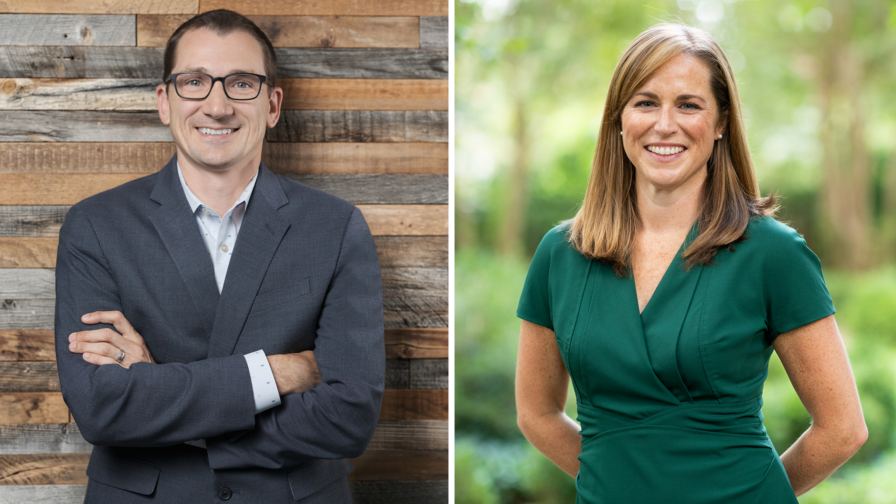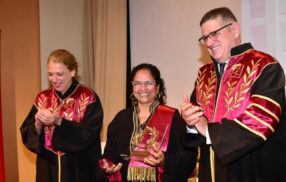
Q&A: Darden Alumni Leaders Share Venture Capital Insight
By Derry Wade
Leaders from across the national venture capital landscape will gather next month for the University of Virginia Venture Capital Conference hosted by Mayo Center for Asset Management at the Darden School of Business. Held on the Sands Family Grounds in Rosslyn on 12 April, the conference will explore how market conditions influence venture capital activity across sectors including defense, cybersecurity, health care and consumer goods.
The Darden Report caught up with two alumni who will be participating in the event to learn more about their experiences in venture capital and how Darden prepared them for success.
Caitlin Mavraganis (MBA ’11) is managing director of Selby Lane Capital, which builds venture capital, growth equity and private equity fund portfolios for clients. Mavraganis oversees Selby Lane’s investment-side activity, sourcing investment opportunities, building relationships with potential fund managers, and conducting due diligence on funds prior to Selby Lane making a commitment.
Matthew Kemph (EMBA ’23) serves as vice president of Mission Partnerships at In-Q-Tel (IQT), a not-for-profit strategic investor serving the technology needs of the national security community. Kemph guides the effort to match innovations from companies IQT has invested in with the priorities and emerging needs of the intelligence community.
What kind of person excels in the venture capital business? Do any specific traits seem to help most?
Mavraganis: There isn’t really a standard career path required to get into the venture industry, but there are some traits that many of the most successful venture capitalists share. The first is the ability to see the potential in nascent technologies and markets that others have not recognized yet. Venture capitalists also need to be able to accurately assess company founders as people and form strong relationships with them to gain access to the best new companies.
Kemph: Someone who will grind, hustle and execute while taking risks. In the context of IQT, a person’s success in this venture capital business is deeply tied to the organization’s mission of identifying, investing in, and supporting cutting-edge technologies that can serve U.S. national security interests. Individuals who excel at IQT combine the skills to discover, evaluate and capitalize on innovative tech startups that are mission-aligned. They possess a visionary mindset, identifying future trends and growth potential to maintain technological superiority for the nation.
Is there an industry segment or specific company that you are particularly excited about as an investor?
Mavraganis: We are seeing a real technological shift with the developments in the AI space over the last two years and I think it will have a meaningful impact on the way we interact with and use technology going forward. However, there is a lot of hype around AI in the venture industry and significant capital pouring into that space, driving up valuations, so we are being cautious about the funds we back to invest in that space. We are looking for VC funds with experience in AI, who have a deep network of quality AI talent to source new opportunities from, and those with a clear thesis around how to build a defensible and scalable business in this space.
Kemph: I see immense potential and significance in cybersecurity. The increasing digitization of our world has paralleled a rise in cyber threats. Innovations in cybersecurity are more than just exciting from an investment perspective. They are crucial for national security. For IQT, it is not about the return (we are a not-for-profit organization) but more about the impact of our investments on our country. IQT’s work plays a pivotal role in identifying and supporting startups on the cutting edge of cybersecurity technology. These companies will significantly influence how our government and industry prepare for and mitigate cyber threats in future conflict scenarios.
What do you find most satisfying from a personal and professional standpoint about your work?
Mavraganis: I get to meet with some of the smartest and most successful venture capitalists every day and learn from them about cutting edge technologies and the exciting new companies in their portfolios. The venture industry is always evolving, and our work requires that I stay relevant on the latest trends to inform how we invest our clients’ capital. I also value the personal relationships that I have formed with many of the VCs in our portfolio, some of which now span more than a decade.
Kemph: The most satisfying aspect of my work at IQT is its unique opportunity to blend my passion for venture capital and entrepreneurship with a larger purpose of national service. I take immense pride and satisfaction in leveraging my skills to identify, evaluate and leverage commercial technologies that could play a key role in enhancing the security and capability of our country.
How did Darden prepare you for this career choice?
Mavraganis: One of the most useful skills I learned at Darden was how to make a decision and take action without perfect information. Our job at Selby Lane is to evaluate fund managers, typically using historical information, and decide if we believe the same manager will deliver compelling investment returns in the future. We complete exhaustive quantitative and qualitative diligence on potential funds, but at the end of the day we are required to make a judgment call on each investment. Darden prepared me well to be able to make quality decisions when faced with uncertainty.
Kemph: Darden played a pivotal role in honing the skills necessary for my career. Its negotiation, leadership, venture capital, marketing and strategic planning courses equipped me with the expertise needed to be integral to my current role. Furthermore, applying the case study method sharpened my critical thinking and decision-making skills, particularly in situations involving complex, incomplete information — a common scenario in the venture capital domain. Although being cold-called in classes was initially challenging, it proved beneficial in building resilience and readiness. The entrepreneurship-focused classes were my personal favorites, as they provided in-depth insights into the dynamics and obstacles relevant to startups, which is crucial in my role of supporting early-stage tech firms.
What do you hope to contribute and receive from the Venture Capital Conference?
Mavraganis: I am looking forward to participating in the Limited Partner panel at the conference and having the opportunity to share with many of the students and conference attendees more about the LP side of the venture business.
Kemph: I aim to contribute by sharing my insights and experiences from working at IQT. I look forward to discussing our unique challenges and successes and how these lessons apply to the broader VC industry. I’m incredibly excited to engage in conversations around tech discovery and other rapidly advancing areas critical to national interests. On the receiving end, I’m eager to learn from other experts in the field. Furthermore, the conference is a great platform for networking with other UVA/Darden alums, which can open new paths for collaboration and partnerships.
The University of Virginia Darden School of Business prepares responsible global leaders through unparalleled transformational learning experiences. Darden’s graduate degree programs (MBA, MSBA and Ph.D.) and Executive Education & Lifelong Learning programs offered by the Darden School Foundation set the stage for a lifetime of career advancement and impact. Darden’s top-ranked faculty, renowned for teaching excellence, inspires and shapes modern business leadership worldwide through research, thought leadership and business publishing. Darden has Grounds in Charlottesville, Virginia, and the Washington, D.C., area and a global community that includes 18,000 alumni in 90 countries. Darden was established in 1955 at the University of Virginia, a top public university founded by Thomas Jefferson in 1819 in Charlottesville, Virginia.
Press Contact
Molly Mitchell
Associate Director of Content Marketing and Social Media
Darden School of Business
University of Virginia
MitchellM@darden.virginia.edu




